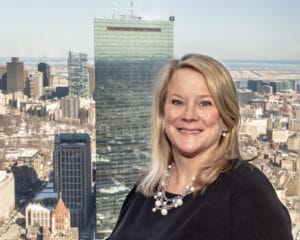Martha Sheridan
President and CEO, Greater Boston Convention and Visitors Bureau
Age: 60
Industry experience: 30 years
Greater Boston’s Convention and Visitors Bureau has a new source of funding to promote the region as a travel destination and shore up the battered hospitality industry. The Boston-Cambridge Tourism Destination District was formed last summer with the approval of a 1.5 percent fee on hotel stays, and began delivering funding to the group in November. Martha Sheridan is CEO of the Greater Boston CVB and took on a national role in January, when she was appointed co-chair of the Meetings Mean Business Coalition (MMBC). Backed by the U.S. Travel Association, the coalition which comprises approximately 60 hotel companies and tourism councils promotes the importance of business travel and professional meetings.
Q: In your additional role at the MMBC, what are the goals for 2022?
A: Our priorities really cover resuscitating the meeting sector. We are seeing meetings happen again, which we are very grateful for. Attendance levels are about 50 percent of their prior levels. Some of that is due to the health crisis, but other factors include the newfound ability to do more remotely. Our goal as a coalition is to first of all amplify what our industry is doing to keep meetings safe and to underscore the importance of meeting face-to-face. Transactions aren’t as meaningful without face-to-face interactions.
Q: How is the industry developing standards on meeting safety across the various locations and different regulations?
A: It varies by locale, because there are different protocols in place for Massachusetts and for Boston in particular. We have the vaccine mandate, so any meeting in a hotel or facility outside of a private residence, you have to check vaccine status. That wouldn’t be the case in a place like Florida. In Boston, you need to wear a mask. The major brands – the Hyatts, the Marriotts and the Hiltons – are trying to standardize their protocols across destinations so meeting planners know what to expect if they meet in a Marriott-branded hotel, for instance. Boston hotel occupancy in 2021 was about 45 percent. In 2020, it was 20 percent and in 2019, it was 83 percent [according to Pinnacle Advisory Group data].
Q: What’s the latest indication of how 2022 will stack up in Boston?
A: Meetings were rebounding back until the omicron variant took a toll on our January activity. I think from February on we are going to be back into a pretty robust recovery mode from a meetings perspective. At the Hynes and the Boston Convention and Exhibition Center, their schedules are fully intact for the year and they layered in some groups who canceled from previous years. And then the hotels are definitely seeing activity.
We’re not at all, from a short-term booking perspective, back to pre-pandemic levels. The big difference is the convention center books many years out. We are running a promotion right now for the first quarter to incentivize short-term bookings in the marketplace. [The program offers 10 percent discounts on group business booking 10 or more rooms at Boston and Cambridge hotels.]
From a leisure perspective, that was the only market that carried us through and that has helped us move toward recovery for the last two years. People are coming in for a two- or three-night stay. Corporate travel is still a challenge for us and everyone. Omicron did a number on our projections. We anticipated many corporations going back to the office at least part-time in January and that took a backslide. Until they get people back in the office, they’re not going to encourage a lot of out-of-state travel. We are pretty bullish once people feel comfortable traveling between countries, that Boston is going to be a popular destination.
Q: How has the Boston vaccine mandate affected visitor and tourism activity?
A: It’s too soon to tell. Anecdotally, you’re seeing on social media the restaurants are feeling a bit of a hit, but there are so many factors that could be playing into that. From a hotel perspective, you don’t need a vaccine to stay overnight, only to dine in the restaurant or attend a meeting. Most meeting planners are already requiring proof of vaccination, whether you’re in Boston or Chicago. I’ve been to several conventions over the past year and all of them require you to post your vaccine status.
Q: How does the approval of the new Boston and Cambridge tourism destination marketing district affect your funding?
A: We received close to $3 million from the Massachusetts Office of Travel and Tourism, and then we have our new funding from the TDMD. The collections on that started in October, and we received our first check for north of $2 million. We anticipate receiving between $18 million and $20 million in 2022. We’ll be doing international promotions, setting up offices in key international markets like the United Kingdom and Ireland and Germany, and have an enhanced presence at trade shows focused on generating more meeting and convention business. Leisure advertising will be a very large focus and also using some for funds incurred by organizers such as transportation costs.
Q: What are some of the major events that will generate significant visitor traffic this year?
A: The Boston Marathon in April will be back in full swing, and next week we’ll have the Yankee Dental Congress which will be 8,000 to 10,000 attendees. In March, we have the 40th anniversary of the Seafood Expo North America coming back to the BCEC.
Sheridan’s Favorite Recently Watched TV Shows:
- Yellowstone
- Maid
- Succession
- Queen’s Gambit
- Summer of Soul




 |
| 

